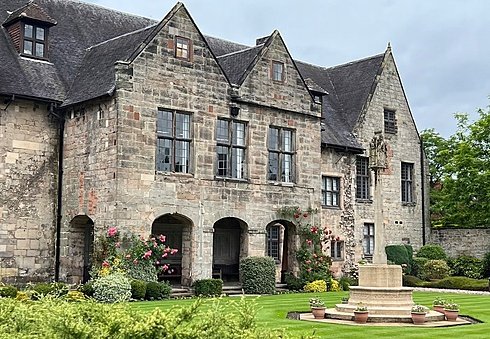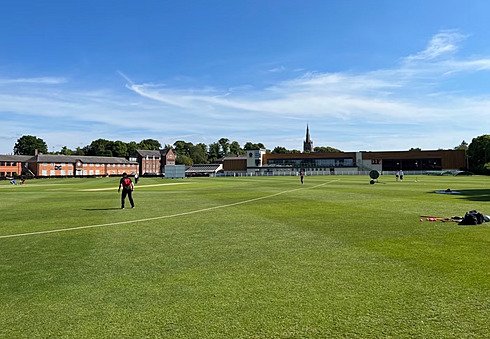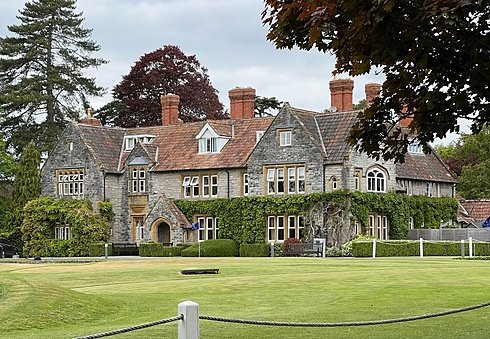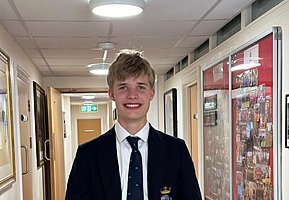

Max’s Start at King’s Bruton
This time we spoke with Max, who attended King’s Bruton boarding school in Somerset, located in southwest England. Max shares his honest impressions and experiences, describing what shaped him the most during his time there. He offers fascinating insights into daily life, discusses challenges, and compares school life in England and Germany.
Max, could you introduce yourself?
My name is Maximilian Dirksen, I’m almost 17 years old, and I’m from Düsseldorf. From early September 2023 to late June 2024, I attended King’s Bruton in England. Before going to boarding school, I was a student at Görres Gymnasium, where I skipped the 10th grade due to strong academic performance, moving straight from 9th to 11th grade.
How did you get the idea to attend a boarding school in England?
At first, I wasn’t very excited about the idea of studying abroad because I didn’t really want to leave home. But my parents had been planning it for two or three years. The importance of good English skills eventually convinced me. In the end, my parents left the decision up to me.
After doing some research and talking to others who had already had this experience, I became curious. It was the perfect opportunity not only to improve my English but also to learn about a different school system and become more independent. It was also a chance to step out of my comfort zone and experience something completely new. So, the decision became easier over time.
I visited three schools in total, including Dean Close School. Unfortunately, I don’t remember the name of the third one. All three schools had strong hockey programs, which was an important factor for me.
Why did you ultimately choose King’s Bruton?
The decision for King’s Bruton was pretty straightforward for me. One of the main reasons was hockey. I was determined to attend a school with a strong hockey program, and King’s Bruton met that requirement perfectly. But it wasn’t just about sports. Compared to the other schools I visited, King’s Bruton had a very family-like atmosphere. You felt like everyone knew each other, and it was clear that the school made new students feel genuinely welcome. This combination of a sporty environment and a warm, open atmosphere is what convinced me in the end.
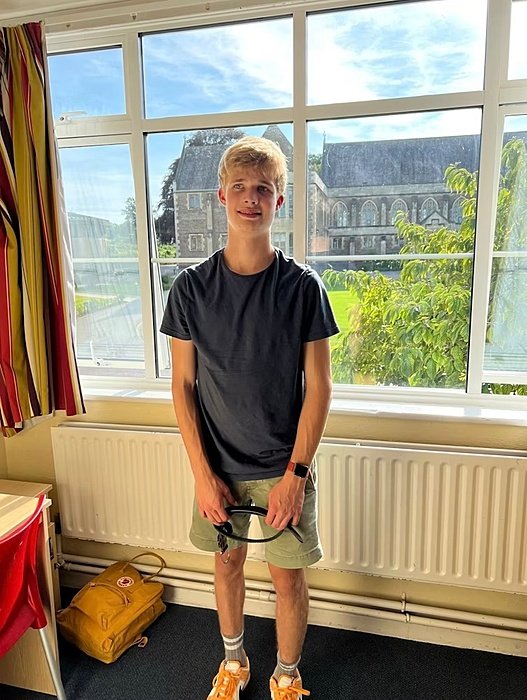
Max' first day
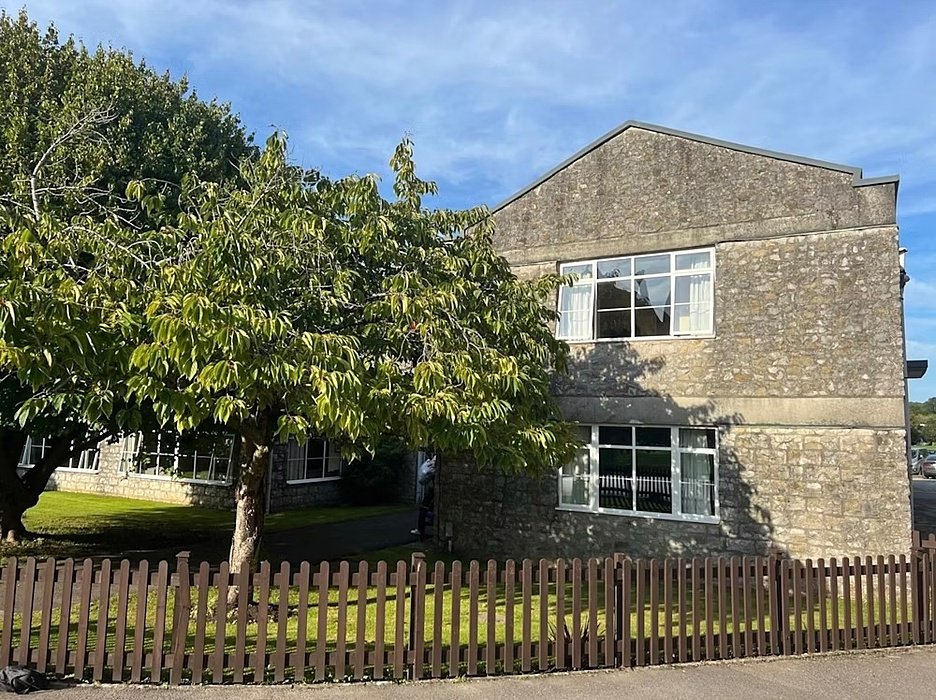
Max‘s boarding house Blackford
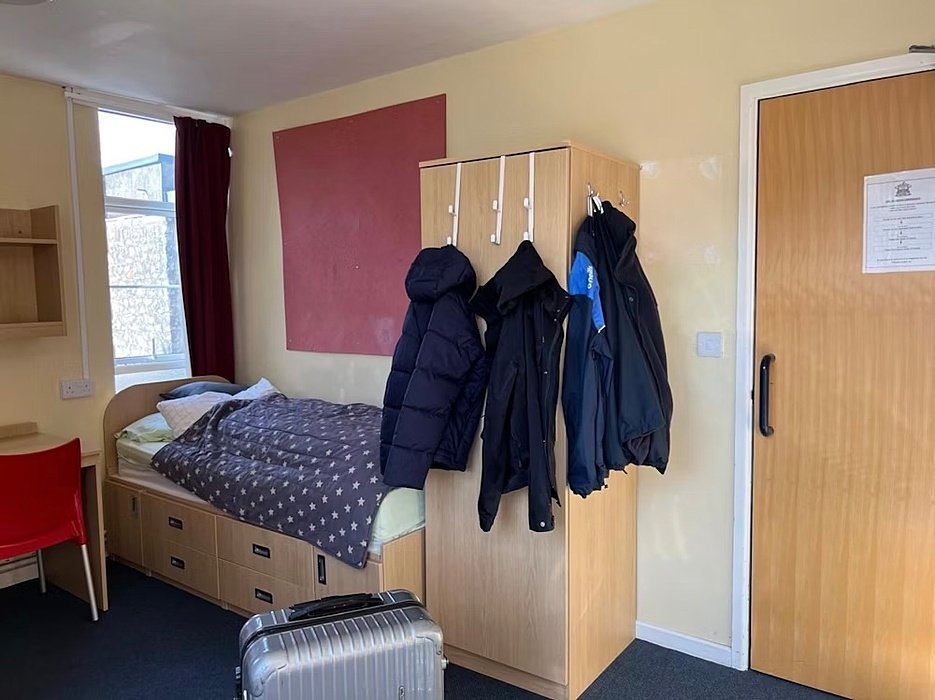
His first room – simple, practical, cosy
Max’s Life at King’s Bruton
What was your first day at the boarding school like?
On the Saturday before my first day, my dad and I traveled to Bruton. On Sunday, we headed to the school at a leisurely pace. The Head of School was in my house and welcomed all new students, showing us to our rooms. After my roommate arrived, we went to the common room and got to know others in the house.
I already knew a few people, including a friend from Germany. On the first evening, we ate together and explored the house a bit. It helped me settle in quickly, and having familiar faces around was comforting.
The first school day started with a house assembly, where all the new students were officially welcomed. There were two Germans in my year, and neither of us knew where everything was at first. Fortunately, we had our timetables, and we quickly found our way. After a school day that ended around 3:30 p.m., there were afternoon activities. I chose indoor hockey. At 5:30 p.m., we had the first prep session, a time set aside for study or homework, followed by dinner and a second prep session.
Max’s life in his boarding house in King’s Bruton
What was your house and room like?
My house was called Blackford, located right on the school grounds. Rooms were switched every three months. To my surprise, we moved early for Christmas, and I had to borrow suitcases for my things. Ours was the only house that moved in December; others moved in January. A new shed for luggage later made things easier.
Room changes meant I got to meet new people regularly. At first, it felt strange because we couldn’t lock our doors. Luckily, my roommate was often away on weekends, so I had some quiet time. It took about three to four weeks to adjust, but then it became routine.
We had to wear school uniforms, which, in hindsight, I appreciated. It changed the atmosphere and made us approach lessons differently. Though buttoning up the top of my shirt at 7:15 a.m. while half-asleep was annoying at first, I got used to it. Twice a year, we had “Mufti Days,” where we could wear casual clothes in exchange for a donation. It felt completely different. The uniform brought structure to the school day.
How was your relationship with your house parents?
Our housemaster was quite unique! He was a history teacher and in his final year at the school. His leadership style was influenced by his military background, making him disciplined and highly respected. Yet, he was also warm and approachable. He had played hockey in his youth, which gave us a shared connection.
Interestingly, he had been stationed in Germany, so he had a special fondness for German students. Although he wasn’t fluent in German, he understood more than he could speak. However, we mostly communicated in English. He greatly shaped life in the house, and I learned a lot from him.
There was also a matron who was like a second mother to us. She was the go-to person for everyday issues. While I didn’t face many problems, she was always there when I needed help, whether it was fixing a power outlet or bringing meals when I was sick.
Did you ever feel homesick?
Yes, especially in the first few days and occasionally after weekends at home. In the evenings, when things quieted down, I sometimes felt homesick. But it passed quickly. The busy schedule and exhaustion from the day didn’t leave much room for those feelings. Adjusting to the new rhythm took time, but it became easier over the weeks.
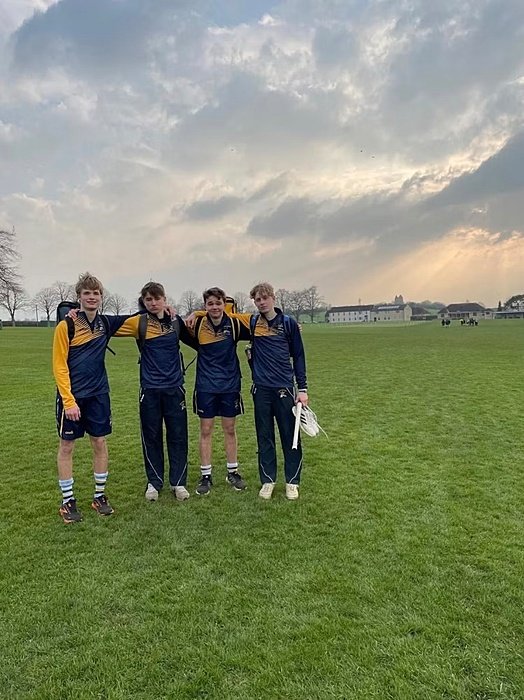
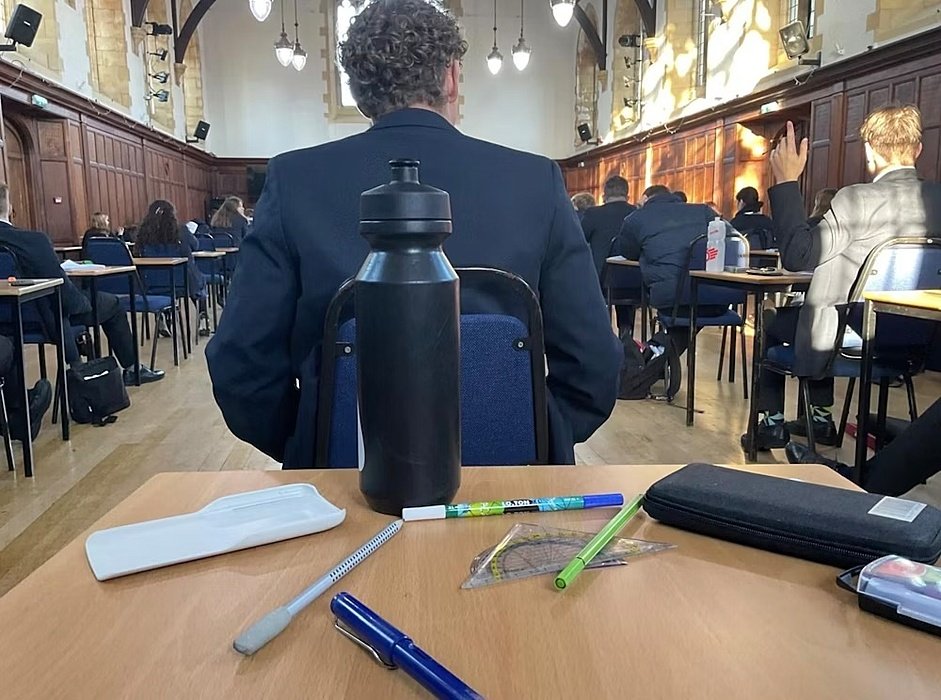
During the mock exams for the GCSEs in the Memorial Hall
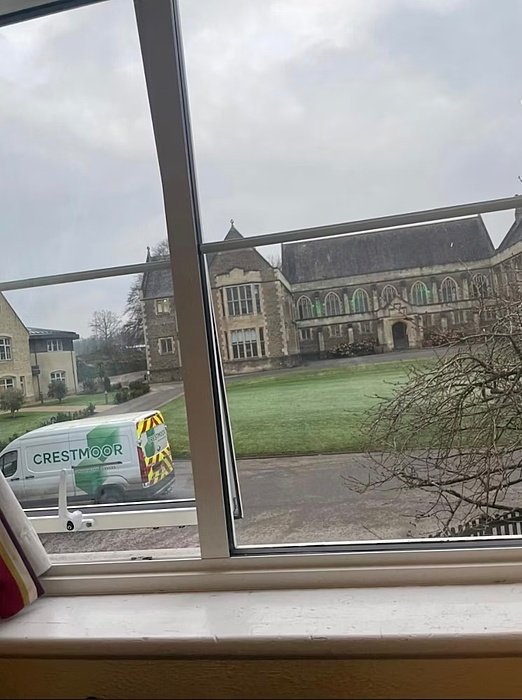
England vs. Germany – A Comparison
What surprised you the most about boarding school life?
What surprised me most was the close interaction between teachers and students. At boarding school, you don’t just see your teachers in the classroom but also in daily life—at breakfast, on your way to class, or during activities. Standing in the breakfast line next to your physics teacher felt strange at first but created a very open and approachable environment.
What were the biggest differences between German and English schools for you?
The school day in England was much longer, with extended classes and activities, all within walking distance. This was very different from Germany, where driving is often required. At King’s Bruton, everything was conveniently close, making daily life more efficient.
Another major difference was discipline. Homework couldn’t be postponed, and the strict schedule motivated us to stay on top of tasks. Missing assignments led to warnings, which encouraged accountability.
Academically, there were differences too. History classes in Germany focus heavily on German history, while in England, topics like China, America, and Russia were prominent. This broadened my perspective, though it was an adjustment at first.
When did you first make friends?
The community among the students was truly something special. At first, I felt like I was constantly meeting new people. There was a very open atmosphere, and even though I came as a newcomer from Germany and my English wasn’t perfect, the others immediately included me. They could have just stuck to their usual friends, but instead, they actively reached out to me and asked how I was doing. This made it easy for me to feel comfortable quickly and form friendships.
On weekends, when many students from other houses were away, I was even allowed to stay overnight with friends in other houses. I just had to ask my housemaster, and he agreed. The sense of community was so strong that you felt welcome even beyond your own house. Especially toward the end, I often stayed at the home of an English friend, and it felt as though everyone belonged to one big family.
The friendships have lasted even after leaving the boarding school. I’m still in close contact with one friend in particular. Before the final day, I even stayed at his place for three days, and he’s coming to Düsseldorf in February because he has friends here as well. We will definitely meet up when he’s here.
We had also planned to go to Oktoberfest in September with him and three other Germans, but unfortunately, that didn’t work out. I still have occasional contact with a few others.
Did you ever have conflicts?
Yes, there were occasional arguments, especially during hockey matches. As it often happens in sports, when there were hard fouls, conflicts arose. Personally, I never had any major issues with others. When conflicts did occur, they were usually resolved quickly and straightforwardly, often with the help of the housemaster, who handled such matters. Overall, I rarely witnessed direct disputes because the sense of community in the house was very strong, and most conflicts were resolved calmly.
What were your weekends like?
Weekends at the boarding school varied a lot, depending on whether we had a match or a free weekend. In the second trimester, we played a lot of hockey. On Saturdays, we had school until noon, followed by sports. If we had a match, we were usually busy until around 5 PM. After that, we had free time, which was often a welcome break after a busy week.
After dinner, we in the 5th Form could go to one of the clubs. There were clubs for the younger years—3rd, 4th, and 5th Form—and a separate club for the 6th Form. However, we in the 5th Form rarely went to the club because we felt “too old” for it. Instead, I often watched football on Saturday evenings. Lights out began at 10:45 PM.
On Sundays, we were allowed to get up at 9:30 AM; before that, it was quiet time. Initially, there was a church service every two weeks in our chapel, which later became once a month. After that, there was brunch around 11 AM. The rest of the day was mostly free, except for regular roll calls every two hours, where we had to check in briefly. Sundays were a time to relax, catch up on sleep, or study, especially during the GCSE exam period.
Occasionally, trips were offered, such as to a water park, for which you had to sign up a week in advance. Otherwise, Sundays were often about resting and recharging.
What was the relationship between the boarding students and the locals?
The school was actually located somewhat “in the middle of nowhere,” which meant there was little interaction with the locals. In Bruton, there’s a main street where you could shop, but it was almost exclusively used by students. The school felt like its own little world, centered entirely around the daily life of boarding students.
What was the food like at King’s Bruton?
The food at the boarding school was generally very good. The kitchen made an effort to offer a varied selection, and there was dessert every day, which was always a highlight. Both lunch and dinner were warm meals, and the dishes rotated every two weeks, so it never got boring. In the mornings, I particularly liked the hash browns. One of my favorite dishes was chicken with rice.
On Fridays, there was always fish and chips, which I didn’t like as much. The fries were a bit soggy, and that just wasn’t my thing. But there were always suitable options for vegetarians. There was a salad bar, soup every day, and always a vegetarian version of the dishes. Bread was always available too. Overall, the selection was very diverse, and everyone could find something they liked.
Of course, you could tell it was typical boarding school food at times, but on the whole, the quality was really good. Not comparable to home-cooked meals, but it was always sufficient and filling.
Were there special school traditions or events at the boarding school that you particularly liked?
Yes, there was one very special event that left a lasting impression on me: Remembrance Day for the victims of wars. On this day, we all received a red poppy flower and went to the Memorial Hall. On the walls there, the names of all former students who served and lost their lives in various wars, from the First and Second World Wars to other conflicts, were engraved.
This day was very solemn and impressive, accompanied by music from an orchestra. It was a very moving moment that I’ll never forget. Otherwise, there were hardly any holidays or special days off like the ones you might know from Germany.
What was the sense of community like between the houses? Were there competitions?
The community between the houses was very lively, and competitions were regularly held. One of the most popular events was the “House Competition,” where students logged their practice hours in various activities. At the end, the house with the most points was declared the winner.
The three students who practiced the most also received a £50 voucher for a nearby restaurant. There were also soapbox races, where we built our own soapbox cars and competed against other schools.
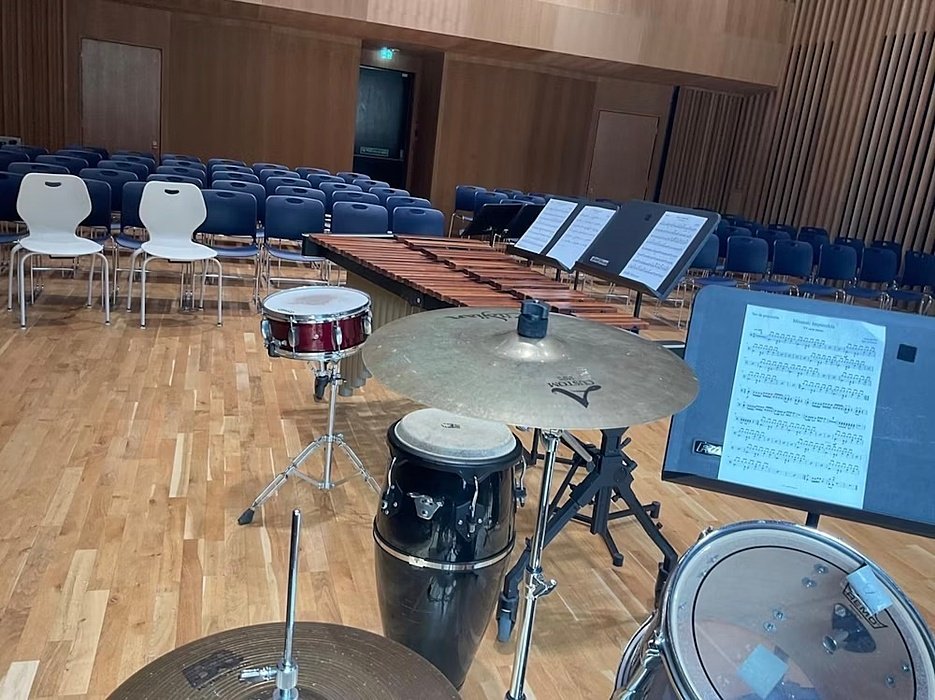
This is where the concerts took place
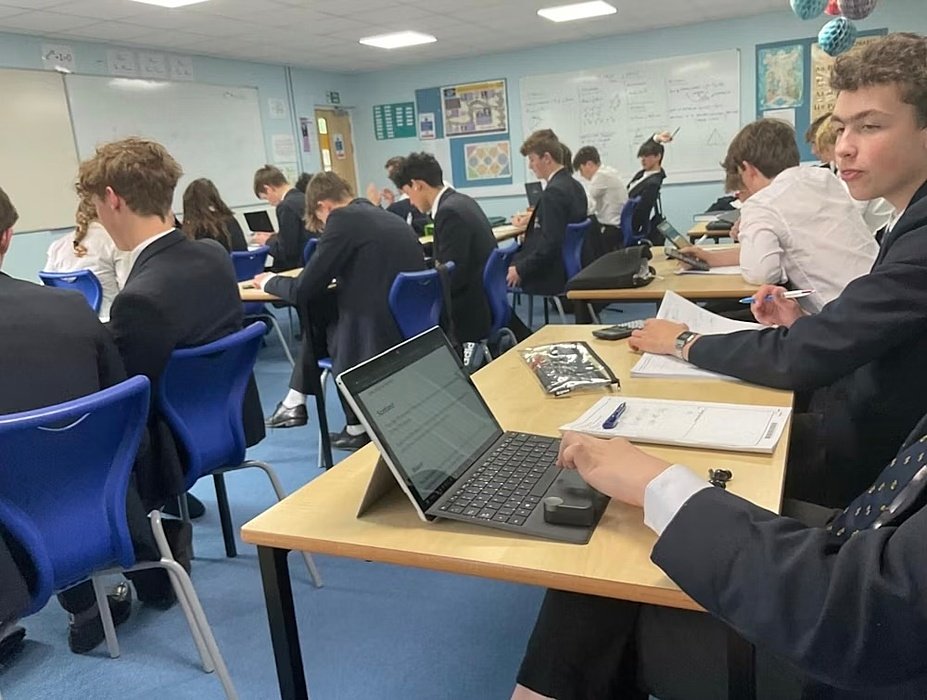
Paying attention in math class
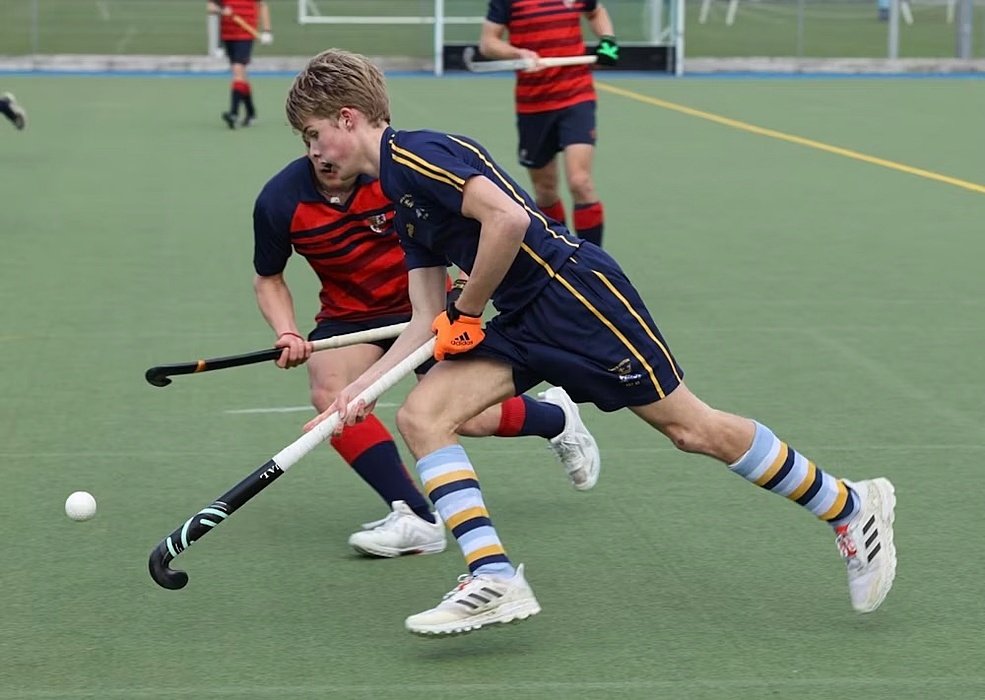
Max playing hockey with his team, unofficially called "Bruton Dolphins"
Academics: Learning at King's Bruton
How did you manage classes in English?
Classes in English were initially a challenge, especially in science subjects like Physics, Chemistry, and Biology. I already didn’t enjoy science much in Germany, and in England, the level in these subjects was significantly higher. My classmates in the course often had advanced knowledge, with some planning to study Physics at university. Sitting there as a German student, I often thought, "This topic might not come up for another four years in an advanced course back home." That, of course, made it harder to understand the material right away.
Latin, on the other hand, was easier for me because translating from Latin to English was simpler than translating to German. At the beginning, we were even allowed to use Google Translate to get accustomed to new terms and structures. English class itself wasn’t a problem. The language wasn’t the biggest hurdle—it was more about the topics and content, which could sometimes be quite demanding. Despite the initial difficulties, I eventually got along well in class.
What did a typical schedule at King's Bruton look like for you?
My schedule was quite packed. I had core subjects like English, Mathematics, and the three sciences—Physics, Chemistry, and Biology. In addition, my elective subjects were Latin, History, and Music. Sports were also a mandatory part and had a completely different emphasis compared to Germany.
In Music, I had two teachers. With one, I worked on compositions and wrote two of my own pieces during that time. Initially, I tried using sheet music, but in the end, I mainly used GarageBand (software for virtual instruments) to create my compositions. It was a brand-new experience and a whole different world for me.
The schedule was divided into A and B weeks. Classes went until 3:30 p.m. on Mondays, while on Tuesdays and Thursdays, they ended at 1 p.m., followed by sports. Wednesdays were the longest days, ending at 4:30 p.m., while Fridays finished at 1 p.m., followed by activities, which for me was usually hockey. During A weeks, I had four free hours because I didn’t take French. Instead, I had studied Ancient Greek in Germany and was able to continue that in England.
We even had our own room for it, and my parents organized a tutor to help me with Ancient Greek. The school was very cooperative and provided this opportunity for me. I still study Ancient Greek today and am glad I didn’t have to give it up during my time in England.
Did you have a favorite subject?
Yes, History was definitely my favorite subject. I simply love it, and that didn’t change in England. I also chose Latin with enthusiasm, mainly hoping to earn my "Latinum" qualification.
There were, of course, many other elective subjects, but I wasn’t in the mood to experiment much when choosing my classes. That’s why I focused on three subjects I was already good at in Germany, thinking that would make it easier. And in the end, it worked out well.
Was there a subject you struggled with?
Yes, the sciences—Physics, Chemistry, and Biology—were definitely a challenge for me. Music also proved difficult. On the first day of Music class, my teacher immediately told me it could be tough to achieve a GCSE in Music. Students not only had to compose but also listen to songs and write out the notes. That was a whole different league.
Even though I felt quite overwhelmed, the teachers were very supportive. While others prepared intensely for their GCSE exams, I still managed to contribute. I tried to listen, take notes, and memorize things. Sometimes I even raised my hand and shared my thoughts, though it was clear I wasn’t on the same level as the others. Still, the teachers always paused to answer my questions, even if I couldn’t keep up for long because it was so complex.
Did you have a favorite teacher?
Yes, my favorite teacher was definitely my English teacher, Mr. Hamilton. His motto was "Short-Term Pain, Long-Term Gain," and he was truly a very motivated teacher. Not only was he my English teacher, but he was also my house tutor, so we had a close relationship. He didn’t just teach well but also encouraged us to think long-term and focus on bigger goals.
One moment stands out: It was the last class before vacation, and after six weeks of school, my brain was exhausted. Yet he kept us motivated and focused throughout the lesson. Five months earlier, I might have said, "I’m not writing this text now," but by that point, I had learned to persevere—and I owe that to him.
He struck a good balance between strictness and support, and I even had one-on-one lessons with him sometimes. That was a unique experience that made our relationship even more special.
Sports and Extracurricular Activities at King's Bruton
What sports did you play?
I played a different sport each term. In the first term, I played football; in the second, hockey; and in the third, cricket. Practices were held on Tuesday, Thursday, and Saturday afternoons, depending on the chosen sport. It was a great way to try out different sports and have some variety.
Did you participate in other extracurricular activities?
Yes, I played drums, and there were many activities to choose from. If you didn’t find anything, you had to come up with your own ideas. Activities for 3rd, 4th, and 5th Forms were mandatory on Fridays since it was the only short school day. For 6th Form, it was optional, and for 5th Form, it became optional in the third term due to GCSE preparation. But in principle, everyone had to do something.
I participated in indoor hockey on Mondays from 4:30 to 5:30 p.m. Most activities happened during this time slot, with free time beforehand until roll call at 5:30 p.m.
I joined a hockey club once a week organized by the school. Training took place on campus, and besides students, only a couple of external people participated. The coaches were also our school hockey coaches. It was more of a casual practice rather than a competition, and many German students enjoyed taking part.
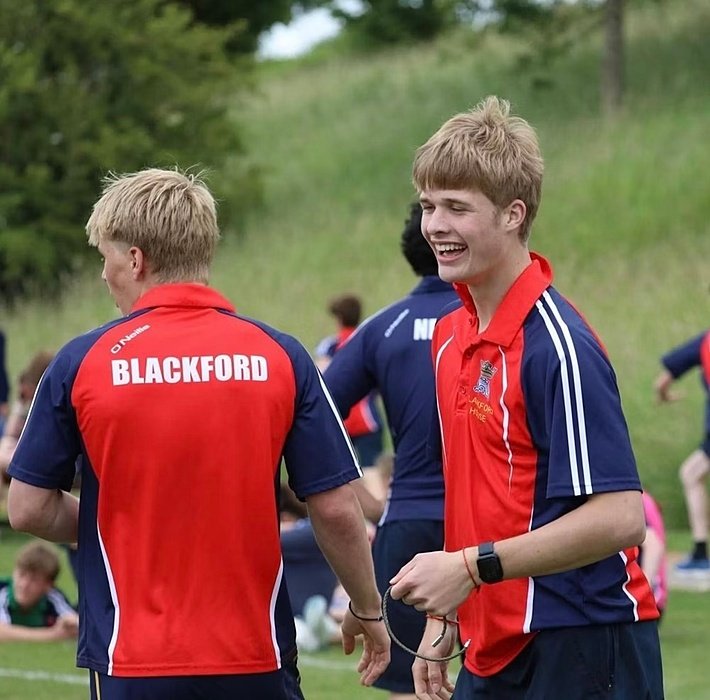
Athletics Day – Max enjoys the team spirit on his penultimate day
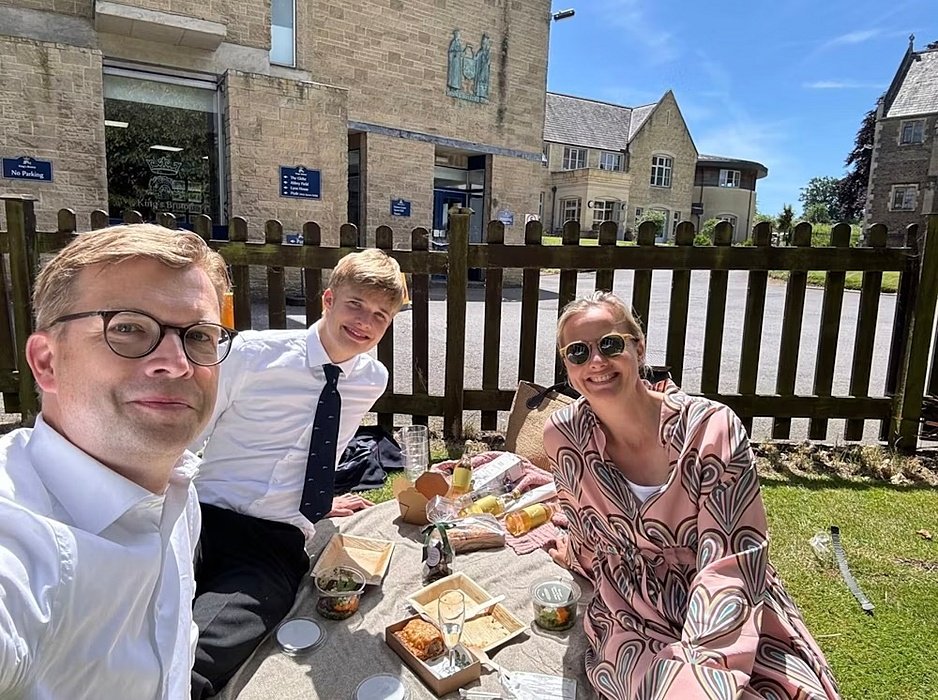
Max with his parents on the last day, one of many memorable moments
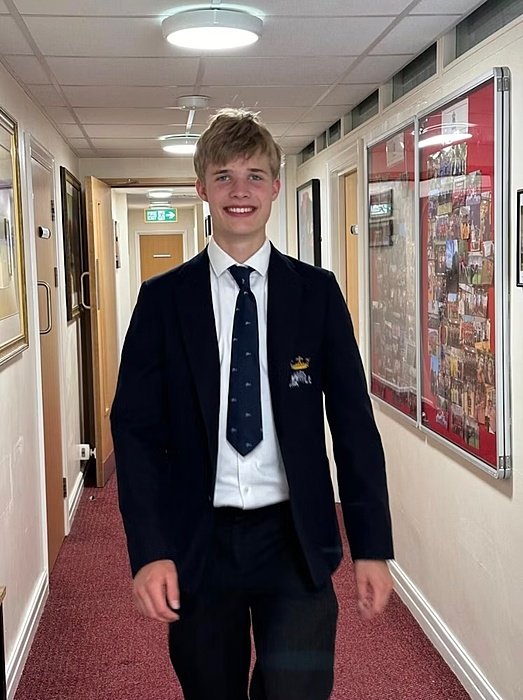
Max in school uniform
Max's Highs and Lows at Boarding School in England
What did you like most about King's Bruton?
What I liked most was the sense of community. It was special that everyone was always together and got along well. I also really appreciated the relationship between teachers and students. The housemaster was a particularly influential figure who had a significant impact on life in the house. All these aspects together made my time there very special.
What were your best experiences?
One particularly funny experience was House Singing. It was a kind of competition between the houses, and our house was desperate to win because it was the only thing our housemaster had never won in his entire career. So, we gave it our all—but it went completely wrong. We sang way too fast and basically messed up everything that could possibly go wrong.
In the end, the judge’s feedback was brutal, and we came in last. It was a bit embarrassing, but also funny because our usually respectful housemaster made fun of the judge's comments. That evening, we celebrated the whole thing with drinks and music and ended up laughing about it.
Another highlight was a hockey match we played against the teachers in early April. The headmaster joined the game, and everyone was watching. It was understood that you shouldn’t be too rough with him or take the ball away from him. But when the students were suddenly losing 0-1, things got serious, and we gave it our all. The teachers had little experience in hockey, which made it even funnier. I remember scoring a goal against one of my teachers, and the next day, he jokingly said, “You idiot, why did you score against me?” That was a really cool moment I’ll always remember.
What did you like least about King's Bruton?
What I liked least was the lack of freedom to make my own decisions. Lights-out was at 10 PM, and we had to hand in all devices like phones and tablets. I found this pretty strict, especially since we had to follow these rigid rules all the time. I looked forward to being back home where I could decide for myself when to go to bed.
We were the oldest class still subject to these rules. Starting in Sixth Form, students no longer had to hand in their devices. Plus, our house was the only one where iPads had to be turned in, while students in other houses could keep theirs. This felt a bit unfair at times, but those were the rules set by our housemaster.
Getting proper medical attention when injured or sick was also a challenge. If I had a fever, I was told to take two tablets, rest for a day, and then return to school. There was a physiotherapist I visited weekly for sports-related issues, and they helped me with hip problems. However, overall, the care was not ideal, especially for more serious injuries or illnesses.
Max’s Reflections and Advice for New Students
Would you do it all over again or change anything?
During my boarding school year, I invested a lot of time in Ancient Greek, which helped me, but I should have done more for my GCSEs. Others started studying in February during the second trimester, but for me, it still felt far away, and I didn’t know where to begin. In hindsight, I would approach this differently, even though I passed the exams.
I would definitely go to boarding school again. However, I would choose different subjects and not pick music again. Instead, I might choose a subject like Food Prep (cooking) or Physical Education (PE), which combines biology and sports. Other than that, I would do most things the same because it was a great experience overall.
Did your time at boarding school in England influence your life and career goals?
My career goals didn’t change because of boarding school. I already aimed to study business and work in an office where I could use my mind. That’s always been my plan.
However, in England, I realized how much effort it takes to truly excel. In Germany, this isn’t emphasized as much in schools. In England, I saw that you need to stay focused to succeed, and this reinforced my ambitions.
Did the school impact your values and personal development?
Absolutely. I’ve become more independent and can manage many things on my own now. Before boarding school, I wasn’t as open with others, but in England, you have to be open to make friends.
I’ve also become more comfortable with my privacy being disrupted. It’s not always embarrassing if people unexpectedly enter your personal space or if spontaneous visits or meetings happen. Being surrounded by so many people all the time teaches you to adapt and handle unpredictable situations better. This has helped me become more flexible and relaxed.
What was the biggest benefit of attending boarding school?
The biggest benefit was definitely becoming more open and learning to interact better with people. This has helped me in many situations. Another significant advantage was improving my English. Before boarding school, my English wasn’t great, but using it daily helped me improve a lot.
I also became more disciplined. Before England, I was sometimes a bit lazy, but I learned that discipline is everything. This mindset has stayed with me and helps me tackle tasks and see them through.
What advice would you give to students considering a British boarding school?
I’d recommend being open to new things from the start. Even if you’re not immediately excited about everything, you should try different activities. There are so many exciting opportunities like Food Prep or other activities I didn’t try but found interesting.
At the beginning, it’s essential to seize every opportunity to connect with people. For example, if your English peers ask you to play football, you should definitely join, even if you’re not a football fan. That’s how you naturally get to know people.

